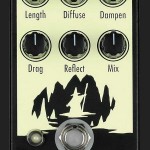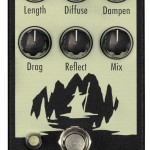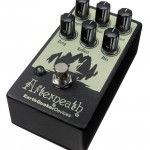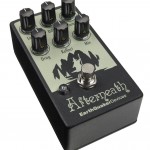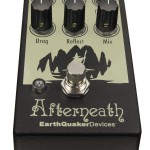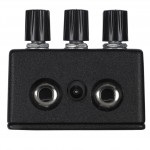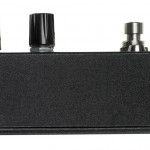Afterneath™
Otherworldly Reverberator
The Afterneath sounds a lot like it looks – a wizard in a cave in a box. You are the wizard – or sorceress, if you prefer – and the cave is your instrument’s signal, vast, expansive, and magical. Do you go inside? Roll a D20 to proceed!
Once inside, a reflection of light from an unknown source catches your eye, and you notice a bizarre sheen on the walls of the cave. You timidly inch closer to the walls of the cave. Placing your hand gently on the cavern wall, you feel the rock move. The cave is alive! Alarmed, you emit a loud gasp, which reverberates throughout the subterranean landscape. Upon further listening, it appears as though the reverberations of your voice are in fact a swarm of short digital delays which may be used to create wild and cavernous reverbs, or scattered, short, rhythmic delays with bizarre characteristics.
Take a moment to consider your Intelligence and Wisdom scores, as well as your spell inventory before proceeding further. You have six spells at your disposal.
Will you cast “Length,” which controls the decay and length of the reverb?
What about “Diffuse,” which adjusts the spread of the reverb? With your wand (or just the knob) turned counter-clockwise, the reverb is sharper with more attack, resulting in a stuttering sputter of individual early reflections. Clockwise casts a washy, more ambient-sounding spell.
Overwhelmed by fear, you hastily cast “Dampen!” As you shout the incantation, you notice that the clockwise variation of this spell results in brighter tones, while as you rotate your wand counter-clockwise; you hear darker tones with a mellower top-end. It’s almost as if your magic changes the hardness of the cavern walls, and thus the tonal characteristics of the reverb!
Elsewhere in your book of spells is “Drag,” which separates the individual digital delay lines, literally dragging them through the very fabric of time and space towards an unknown event horizon from which they may never return. Clockwise “Drag” positions will gather the delay lines close together for a more reverb-like effect. Turn the “Drag” counter-clockwise, and the delay lines will begin to pull apart for a scattered ping-pong delay effect.
The “Reflect” spell alters the depth of the cave, and with it the regeneration of the reverb. This acts as a feedback control and will self-oscillate if cast by a high-level user. Turn clockwise for more wash and echoes, counter-clockwise for less.
Finally, the “Mix” spell alters the alchemical balance between the input signal and the effect. The Afterneath does not go fully wet, but does lower the level of the input signal as you raise this control to create the appearance of a fully wet reverb.
The Afterneath is true-bypass, and built one-at-a-time by a wizard, two bards, a paladin, a monk, a handful of rangers, a couple druids, a barbarian, a rogue, and a Dungeon Master in the Gelatinous Cube of Akron, Ohio, USA.
The Afterneath uses silent relay-based soft touch switching. Audio will not pass without power.
Controls
Length: Controls the decay length of the reverb.
Diffuse: Adjusts the spread of the reverb. Sharper with more attack counter clockwise, more ambient and washy as you turn it clockwise.
Dampen: Clockwise for brighter tones, counter clockwise for darker tones.
Drag: This digital reverb is made up of a bunch of short delays, this separates the delay lines creating a stuttering, pingy effect. This is the coolest control on the Afterneath, we highly advise slowly turning this while you let notes ring out for a cool warped speed effect. More delay as you turn it counter clockwise, more reverb as you turn it clockwise.
Reflect: Controls the regeneration of the reverb, turn clockwise for more wash and echos, counterclockwise for less. This will self oscillate if turned up high.
Mix: Blends the wet signal into the dry. Though it does not actually go full wet, it will gradually lower the clean level as you turn it clockwise and give the appearance of full wet.
Measures
4.75″ x 2.50″ x. 2.25″ with knobs
Power
This device take a standard 9 volt DC power supply with a 2.1mm negative center barrel. We always recommend pedal-specific, transformer-isolated wall-wart power supplies or multiple isolated-output supplies. Pedals will make extra noise if there is ripple or unclean power. Switching-type power supplies, daisy chains and non-pedal specific power supplies do not filter dirty power as well and let through unwanted noise. DO NOT RUN AT HIGHER VOLTAGES!


